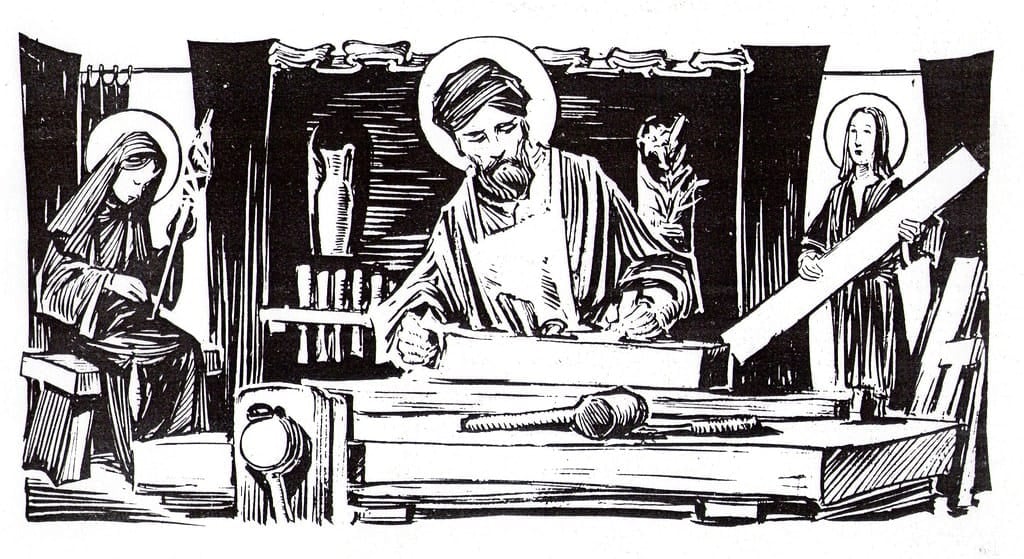Pope Francis recently declared that 2021 will be the Year of St. Joseph, the patron saint of workers. That’s good news for the millions of workers who are suffering from an unjust economic system that the COVID-19 pandemic has only worsened. 2020 has been the year of the owner, but Pope Francis’s proclamation gives us hope that 2021 could be the year of the worker.
Owners of big businesses exploited the pandemic to bolster their personal wealth. USA Today reports, “Over a roughly seven-month period starting in mid-March – a week after President Donald Trump declared a national emergency – America’s 614 billionaires grew their net worth by a collective $931 billion.” If divided equally among every American, that increase of $931 billion, would mean that each person would have gained $2,838.
However, the fact of the matter is that while Mark Zuckerberg of Facebook saw wealth growth of $46.5 billion, Elon Musk of Tesla and SpaceX gained $68.2 billion, and Jeff Bezos of Amazon profited by $90.1 billion, many workers earned lower salaries or were fired. At my university, non-tenured faculty, including myself, received a pay deduction but ended up working longer hours to transition classes to online and hybrid formats.
Yet the COVID-19 pandemic is a mere symptom of a deeper economic problem, one that the Catholic Church addresses in the Compendium of the Social Doctrine of the Church. When Cardinal Renato Raffaele Martino presented this document to the Church in 2004, he called on the intercession of “Saint Joseph, Guardian of the Redeemer and Husband of the Blessed Virgin Mary, Patron of the Universal Church and of Work, so that this text will bear abundant fruit in the life of society as an instrument for the proclamation of the Gospel, for justice and peace.” One of the specific fruits to which the document aspires is a radical change in the way that businesses function. I believe that this change is instrumental in addressing the problem with our economy:
- The relationship between labour and capital also finds expression when workers participate in ownership, management and profits. This is an all-too-often overlooked requirement and it should be given greater consideration. “On the basis of his work each person is fully entitled to consider himself a part-owner of the great workbench where he is working with everyone else. A way towards that goal could be found by associating labour with the ownership of capital, as far as possible.”
The idea is simple. Currently, there is a distinction between labor and capital. Labor consists of folks who sell their bodies to their employers for a certain period of time in exchange for wages. Capital is composed of folks who buy these bodies as well as own the raw materials with which labor works and the products that labor produces. According to this arrangement, ownership and capital are coterminous.
Labor owns neither the raw materials, nor the means of production, the products, nor their bodies during the time at work. Capital owns everything. This distinction means that capital holds significant, almost absolute, power over the workforce.
When the document speaks of associating labor with the ownership of capital, it is truly asking for something revolutionary: a fundamental change in the way that business ownership works. Instead of the concentration of ownership in the hands of a few capitalists, workers will have common possession with capitalists over the enterprises at which they work. They will be able to shape how management and profit work at their companies because they will be “part-owners.” They will have real, meaningful, decision-making power at all levels of authority in their workplaces.
Just as there has been a historical transition in politics from monarchy and oligarchy to democracy, there can be a democratization in economics that progressively puts power into the hands of workers. In the words of Pope Francis in the declaration of the Year of St. Joseph, the Church wants “fraternal communion” to be the new norm in the workplace.
This Catholic vision is ambitious. It is unlikely that the aforementioned business tycoons will surrender power to their workers, even if workers pressure them to do so—at least not in the immediate future. Nevertheless, there is a reason to hope. A small but significant change is within reach.
Workers at Amazon may not convince Jeff Bezos to follow Catholic social teaching on the shared ownership of capital, but workers at Catholic businesses such as hospitals, schools, and other nonprofits can persuade Catholic capital to follow Catholic social teaching.
Laborers at Catholic institutions can organize around their right to own, manage, and share revenue by securing representation on their boards of trustees. They can form unions where unions do not already exist. They can demand that their Catholic employers recognize the rights to which workers are entitled according to the very values their institutions claim to promote. Such a movement of workers would be an important and decisive first step.
It is also possible to leverage the power of ecclesial authorities to achieve the goal of workers’ collaboration with capital. Since bishops grant “Catholic” status to Catholic institutions, bishops could demand that these enterprises comply with a Catholic model of shared ownership in order to retain their Catholic name. The same could be true for businesses that belong to religious orders: religious superiors could call for the organizations under their authority to put paragraph 281 into practice. Pressure to change can come from workers themselves who have an interest in their welfare and from Catholic authorities who have an interest in following the Church’s social teachings.
St. Ignatius writes that it is better to show love in deeds than in words. Right now, the pages of the Compendium and the pages of Pope Francis’ declaration of the Year of St. Joseph are words. In 2021, with the help of the patron saint of workers and with some labor organizing, we can turn these words into deeds. That way, the prayers of Cardinal Martino will indeed “bear abundant fruit in the life of society.”
//
Cover image by Royal Griffin.


